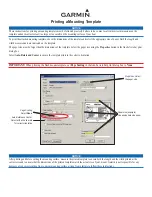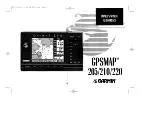
Map Datum
: Sets the coordinate system on which the map is
structured. Do not change this setting unless you are using a
map or chart that specifies a different map datum.
Time
: Sets the time format, time zone, and daylight saving time.
Navigation Settings
NOTE:
Some settings and options require additional charts or
hardware.
Select
Settings
>
Preferences
>
Navigation
.
Route Labels
: Sets the type of labels shown with route turns on
the map.
Turn Transition
: Adjusts how the chartplotter transitions to the
next turn or leg or the route. You can set the transition to be
based on time or distance before the turn. You can increase
the time or distance value to help improve the accuracy of
the autopilot when navigating a route or an Auto Guidance
line with many frequent turns or at higher speeds. For
straighter routes or slower speeds, lowering this value can
improve autopilot accuracy.
Auto Guidance
: Sets the measurements for the
Safe Depth
,
Safe Height
, and
Shoreline Distance
, when you are using
some premium maps.
Route Start
: Selects a starting point for route navigation.
Auto Guidance Line Configurations
CAUTION
The Safe Depth and Safe Height settings influence how the
chartplotter calculates an Auto Guidance line. If an area has an
unknown water depth or an unknown obstacle height, the Auto
Guidance line is not calculated in that area. If an area at the
beginning or the end of an Auto Guidance line is shallower than
the safe water depth or lower than the safe obstacle height, the
Auto Guidance line is not calculated in that area. On the chart,
the course through those areas appears as a gray line. When
your boat enters one of those areas, a warning message
appears.
NOTE:
Auto Guidance is available with premium charts, in
some areas.
You can set the parameters the chartplotter uses when
calculating an Auto Guidance line.
Safe Depth
: Sets the minimum depth (chart depth datum) the
chartplotter uses when calculating an Auto Guidance line.
Safe Height
: Sets the minimum height (chart height datum) of a
bridge that your boat can safely travel under.
Shoreline Distance
: Sets how close to the shore you want the
Auto Guidance line to be placed. The Auto Guidance line
may move if you change this setting while navigating. The
available values for this setting are relative, not absolute. To
ensure that the Auto Guidance line is placed the appropriate
distance from shore, you can assess the placement of the
Auto Guidance line using one or more familiar destinations
that require navigation through a narrow waterway
(
page 23
).
Adjusting the Distance from Shore
CAUTION
The Auto Guidance feature is based on electronic chart
information. That data does not ensure obstacle and bottom
clearance. Carefully compare the course to all visual sightings,
and avoid any land, shallow water, or other obstacles that may
be in your path.
NOTE:
Auto Guidance is available with premium charts, in
some areas.
The Shoreline Distance setting indicates how close to the shore
you want the Auto Guidance line to be placed. The Auto
Guidance line may move if you change this setting while
navigating. The available values for the Shoreline Distance
setting are relative, not absolute. To ensure the Auto Guidance
line is placed the appropriate distance from shore, you can
assess the placement of the Auto Guidance line using one or
more familiar destinations that require navigation through a
narrow waterway.
1
Dock your vessel or drop the anchor.
2
Select
Settings
>
Preferences
>
Navigation
>
Auto
Guidance
>
Shoreline Distance
>
Normal
.
3
Select a destination that you have navigated to previously.
4
Select
Navigate To
>
Guide To
.
5
Review the placement of the Auto Guidance line, and
determine whether the line safely avoids known obstacles
and the turns enable efficient travel.
6
Select an option:
• If the placement of the Auto Guidance line is satisfactory,
select
Menu
>
Navigation Options
>
Stop Navigation
,
and proceed to step 10.
• If the Auto Guidance line is too close to known obstacles,
select
Settings
>
Preferences
>
Navigation
>
Auto
Guidance
>
Shoreline Distance
>
Far
.
• If the turns in the Auto Guidance line are too wide, select
Settings
>
Preferences
>
Navigation
>
Auto Guidance
>
Shoreline Distance
>
Near
.
7
If you selected
Near
or
Far
in step 6, review the placement
of the Auto Guidance line, and determine whether the line
safely avoids known obstacles and the turns enable efficient
travel.
Auto Guidance maintains a wide clearance from obstacles in
open water, even if you set the Shoreline Distance setting to
Near or Nearest. As a result, the chartplotter may not
reposition the Auto Guidance line, unless the destination
selected requires navigation through a narrow waterway.
8
Select an option:
• If the placement of the Auto Guidance line is satisfactory,
select
Menu
>
Stop Navigation
, and proceed to step 10.
• If the Auto Guidance line is too close to known obstacles,
select
Settings
>
Navigation
>
Auto Guidance
>
Shoreline Distance
>
Farthest
.
• If the turns in the Auto Guidance line are too wide, select
Settings
>
Navigation
>
Auto Guidance
>
Shoreline
Distance
>
Nearest
.
9
If you selected
Nearest
or
Farthest
in step 8, review the
placement of the Auto Guidance line, and determine whether
the line safely avoids known obstacles and the turns enable
efficient travel.
Auto Guidance maintains a wide clearance from obstacles in
open water, even if you set the Shoreline Distance setting to
Near or Nearest. As a result, the chartplotter may not
reposition the Auto Guidance line, unless the destination
selected requires navigation through a narrow waterway.
10
Repeat steps 3 through 9 at least once more, using a
different destination each time, until you are familiar with the
functionality of the Shoreline Distance setting.
Communications Settings
NMEA 0183 Settings
Select
Settings
>
Communications
>
NMEA 0183 Setup
.
Port Type
: See
page 24
.
Output Sentences
: See
page 24
.
Posn Precision
: Adjusts the number of digits to the right of the
decimal point for transmission of NMEA output.
XTE Precision
: Adjusts the number of digits to the right of the
decimal point for NMEA crosstalk error output.
Device Configuration
23








































